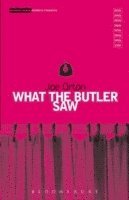
- Format
- Häftad (Paperback)
- Språk
- Engelska
- Serie
- Modern Classics
- Antal sidor
- 96
- Utgivningsdatum
- 1969-05-22
- Förlag
- Bloomsbury Publishing PLC
- Dimensioner
- 130 x 198 x 8 mm
- Vikt
- ISBN
- 9780413366801
- 100 g
What The Butler Saw
- Skickas från oss inom 5-8 vardagar.
- Fri frakt över 249 kr för privatkunder i Sverige.
Passar bra ihop
De som köpt den här boken har ofta också köpt Problematic Summer Romance av Ali Hazelwood (häftad).
Köp båda 2 för 314 krKundrecensioner
Fler böcker av Joe Orton
-
Orton Diaries
Joe Orton, John Lahr, Joe Orton
-
Entertaining Mr Sloane
Joe Orton
-
Complete Plays
Joe Orton
-
Orton Complete Plays
Joe Orton
Övrig information
Joe Orton (1933-1967) was an English playwright noted for his black comedies, which combine genteel dialogue with violent and shocking action. Orton left home at 16 to train as an actor. His subversive style of humour first revealed itself in a bizarre incident in 1962, when he and his lover, Kenneth Halliwell were jailed for defacing library books. The two had carefully removed jacket blurbs from middle-brow novels and substituted their own, mostly scatological, counterfeits. Orton delighted in shocking audiences by breaking taboos surrounding sexuality and death in conventionally structured 'black' farces involving epigrammatic dialogue and frenetic, convoluted plots. Thus, in Entertaining Mr Sloane (1964), a young lodger attempts to lure a woman and her brother into providing him with all he needs, only to find he has become each one's sexual plaything; Loot (1965) is a parody of a detective story involving much comic business with a coffin and a corpse; and What the Butler Saw (1969) stylishly turns farce on its head. Orton was a homosexual in a period before the liberalization of British law, and this side of his life is described in detail in his posthumously published diaries. He was battered to death by Halliwell (who subsequently committed suicide) during a domestic argument at their home in Islington, North London.
Du kanske gillar
-
Gloves Off
Stephanie Archer
Häftad -
Releasing 10
Chloe Walsh
Häftad -
All Fours
Miranda July
Häftad -
Binding 13
Chloe Walsh
Häftad -
Rewind It Back
Liz Tomforde
Häftad -
Caught Up
Navessa Allen
Häftad -
Cover Story
Mhairi McFarlane
Häftad -
Onyx Storm
Rebecca Yarros
Häftad


